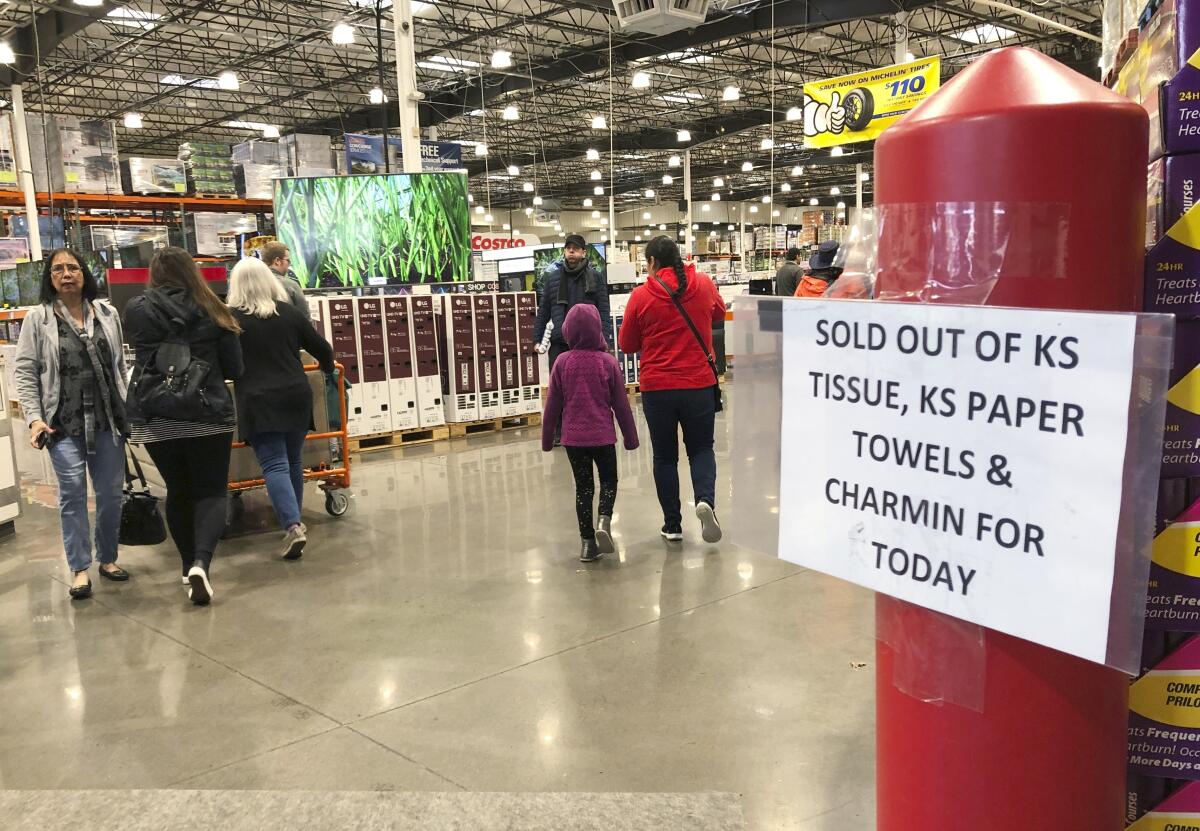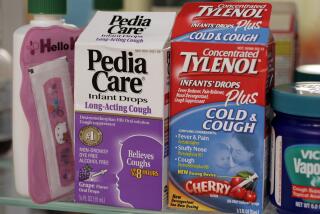Coronavirus panic buying isn’t necessary. It can make things worse, experts say

- Share via
Charmin toilet paper out at Costco. Masks all gone at Walgreens. A run on bags of rice. Even reasonably priced hand sanitizer is seemingly sold out at the world’s largest online retailer, Amazon.
Are Americans prudently preparing for a coronavirus pandemic by stocking up? Or is this irresponsible panic buying?
There are worrying implications for the shortage on some goods. U.S. Surgeon General Jerome M. Adams tweeted Saturday, “Seriously people- STOP BUYING MASKS! They are NOT effective in preventing general public from catching #Coronavirus, but if healthcare providers can’t get them to care for sick patients, it puts them and our communities at risk!”
It’s true that people should be prepared for emergencies, whether it be earthquakes in California or hurricanes in the East. The Federal Emergency Management Agency suggests having, for instance, a two-week supply of water and food and medicine, and if the coronavirus outbreak is causing some to finally get serious about an emergency supply, that may be a good thing.
But some experts in infectious diseases don’t believe the U.S. is on the brink of the situation in China, where hundreds of millions have been in some form of home lockdown, residential buildings have been sealed and where families get a limited number of passes to leave their homes occasionally.
Dr. James Cherry of UCLA, an infectious diseases expert since 1963, says he already has a supply of food and other essentials for an earthquake. As for the idea of stocking up even more in light of the coronavirus outbreak, “I think going out now and stocking up on all kinds of stuff, that doesn’t make any sense to me.”
No one can predict the future, but Cherry, an expert in pediatric infectious diseases since 1963, said the situation in Washington state actually suggests the virus causes only mild symptoms in most people it infects.
“The fact that they noted it had been circulating for six weeks in Washington state before anybody noticed it, with many, many mild cases that went unrecognized, that’s why I don’t think this will be so bad,” said Cherry, primary editor of the Textbook of Pediatric Infectious Diseases.
So far worldwide, more than 90,000 people have been infected with the new coronavirus and more than 3,000 have died in less than three months.
The 1918 flu was particularly devastating, with mortality high in children younger than 5, in younger adults ages 20 to 40 and in people 65 and older. Virtually all deaths were a result of secondary bacterial pneumonia, Cherry said, in an era where there were no antibiotics to treat the bacterial infections associated with the flu.
Based on what we know about nearly 45,000 coronavirus patients in China whose records were studied by Chinese health authorities, none under the age of 10 has died. Those at higher risk of death have been older than 70.
To be sure, people should remain vigilant, and physicians will have to see how the outbreak plays out. The U.S. Centers for Disease Control and Prevention said anyone finding it difficult to breathe needs to seek prompt medical attention, and to call your healthcare provider before seeking care if you suspect the new coronavirus.
People at higher risk for complications and death, and their families, should be especially alert to worsening symptoms. The populations at higher risk include those with underlying medical complications, like diabetes and kidney disease.
“I think we should be concerned about it, because it’s an unknown. But in just my looking at this, I think it’s not that bad for the run of the mill person,” Cherry said. For “older people like me, the risk is clearly higher. But my risk is not as much as the person who is a smoker, who has other risk factors.”
Cherry also said, based on what’s known right now, that while other businesses have started to cancel domestic plane trips, he thought it was fine to fly. Though he wouldn’t go to Italy, China or South Korea, countries the CDC does not recommend for nonessential travel, Cherry said he does plan to take his planned trip to Atlanta next week and Houston in May, barring any new developments.
“I think people shouldn’t overreact,” Cherry said. “I think you should carry on normal schedules.”
More to Read
Sign up for Essential California
The most important California stories and recommendations in your inbox every morning.
You may occasionally receive promotional content from the Los Angeles Times.











